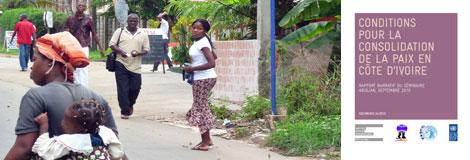International Catalan Institute for Peace ICIP
Cote d'Ivoire seeks to consolidate the peace process with first presidential elections in ten years.
Second round of presidential elections in Cote d'Ivoire
28 november 2010

This Sunday, Cote d'Ivoire is holding the second round of its presidential elections, which will leaed to the re-election of the current president, Laurent Gbagbo - who has held the post for ten years-, or lead to a change in favour of Alassana Ouattara, tipped as the favourite in the north of the country, which has been under insurgent control since the revolt of 2002. For the past eight years, this African country, the world's leading cocoa exporter and the economic dynamo of West Africa, has been divided de facto into two halves: the south, loyal to Gbagbo, and the north, the territory of the Forces Nouvelles opposition.
These elections, which have been postponed for a long time, are an important step in the peace process promoted by the UN, which began in 2003. It is the first time in ten years that Ivorians have been able to vote in presidential elections. The elections were provided for in the Ouagadougou 2007 political agreements, which also included other points that have yet to be fulfilled, such as the disarmament and demobilization of the militias.
The conflict in Cote d'Ivoire broke out in the late 1990s after years of recession and economic decline and a series of conflicts between candidates for the presidency. Each failed electoral process and each round of political negotiations has been affected by what are considered the structural causes of the conflict. Among these causes are the definition of Ivorian identity and nationality - a process that has been complicated by the arrival of thousands of immigrants from neighbouring countries, especially Mali and Burkina Faso - and the right to land ownership .
The precedent of the first round
85% of the population went to vote in the first round of the presidential elections, on 31 October. President Laurent Gbagbo, of the Bete ethnic group, obtained 38% of the votes, and his opponent, Ouattara, of the Senofo ethnic group, obtained 32%. Both have been the central figures in Ivorian politics over the last decade, and have regularly accused each other of fraud and instigating coups d'etat and rebellions, and these accusations have been stepped up in the final days of the campaign. 1,500 troops from the regular army and 500 men from the Forces Nouvelles will be deployed to monitor the elections in the north of the country. Both the UN Secretary General's special envoy to Cote d'Ivoire, J.Y. Choi, and the organisation Reporters Without Borders have asked the media to remain impartial and respect professional ethics. The NGO Convention de la Société Civile Ivoirienne warns that the current tension suggests that the situation after the election will be "uncontrollable," depending on the outcome.
In order to contribute to internal debate and reflection in Cote d'Ivoire, at the end of September the ICIP organised the seminar “Conditions pour la consolidation de la paix en Côte de Ivoire”, in the country's economic capital, Abidjan, in collaboration with the CERAP (Centre de Recherche et d'Action pour la Paix) and the University of Bouaké. The report on this seminar, in which academics, politicians, representatives of civil society and international organisations participated over three days, is now available.


